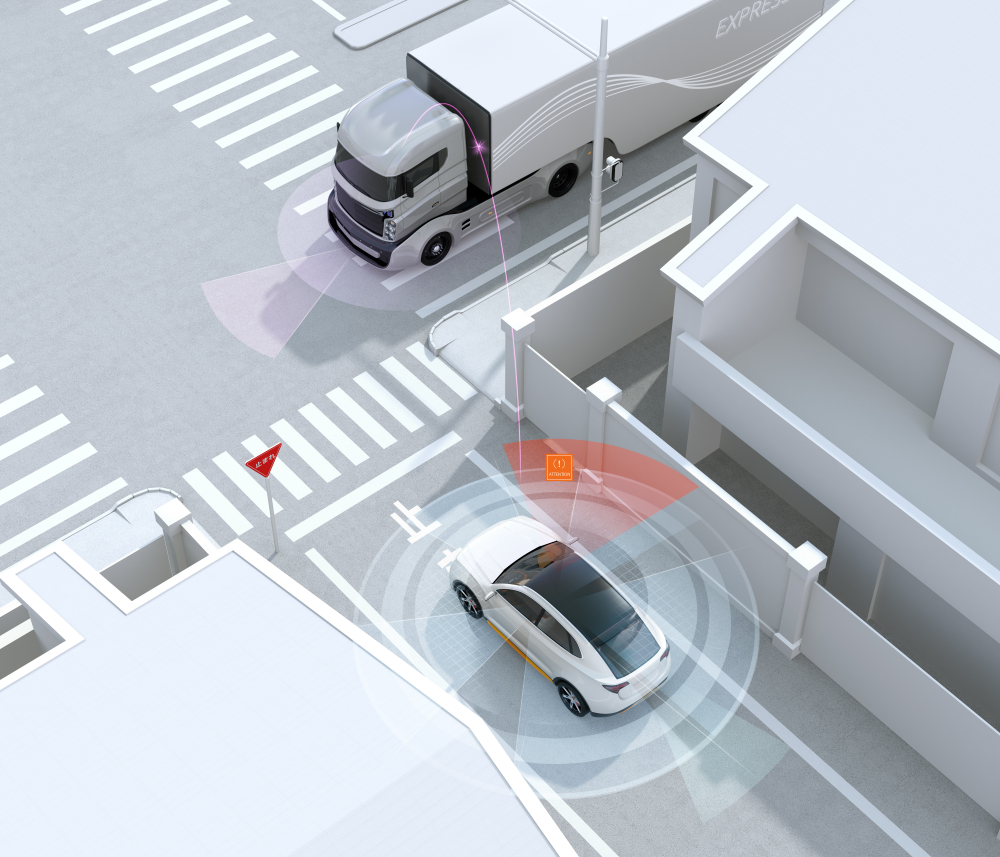Autonomous Vehicles Working Group
Faculty liaisons: Venkat Venkatakrishnan, Bo Zou
intro

Autonomous vehicles stand to reshape how people and things are moved in the United States and around the world. How we develop autonomous vehicles will affect traffic safety, road congestion, public transportation, the environment, information security, jobs and the economy, and quality of life. Researchers and practitioners alike have been working to gain a better understanding of different autonomous vehicle technologies and systems, their applications, and their ramifications as the idea of self-driving cars, boats, trains, and even aircraft capture the world’s imagination and move closer to implementation.
The Autonomous Vehicles Working Group was created to define the role of UIC Engineering in this global conversation, capitalizing on our faculty’s wide array of research expertise.
Focus Areas

UIC Engineering faculty offer strengths in two broad areas:
Shared autonomous mobility systems
Research in this area creates novel models and tools in transportation engineering, operations research, computing, and big data to advance understanding of autonomous vehicle adoption and assess system-level effects of autonomous vehicles on future mobility for passengers and freight. Outcomes of research in this area are expected to inform relevant policymaking and regulation.
Autonomous vehicle motion control and safety
This research involves short-, medium-, and long-term robust control with communications as well as machine-learning techniques to improve autonomous-vehicle movement efficiency and safety. Research of this nature provides excellent opportunities for industry partnerships; UIC faculty members already have several collaborations in place with vehicle manufacturers and technology companies.
UIC Engineering faculty are also active in other areas that are relevant to autonomous vehicles. These include: integration of power and autonomous mobility systems, algorithm design in support of solving complex system modeling and vehicle control problems, cybersecurity, nanomaterial design, test design for fault detection and self-repair, computer vision and visualization, and communication theories. These areas complement the two primary research areas and have significant potential for furthering research investigation and collaboration.
Working Group Mission and Goals
- Establish a community of expertise at UIC in the area of autonomous vehicles
- Collaborate on broad-reaching research initiatives related to autonomous vehicles
- Serve as a conduit for knowledge transfer between academia and industry
- Support the development of undergraduate and graduate curriculum
- Recognize relevant research contributions from within and outside UIC
- Create a clearinghouse of scholarly resources and best practices
Working Group Research Areas
- Autonomous vehicle adoption
- Future mobility system design
- Vehicle motion control and safety
- Vehicle power system design
- Sensing and communication
- Security and privacy issues
- Body materials
- Computer vision and visualization
- Public acceptance, policy, and society-level issues
Affiliated Faculty
The following UIC Engineering faculty are active members of the Autonomous Vehicles Working Group:
Ahmet Enis Cetin
Research Professor, Electrical and Computer Engineering
Dr. Cetin’s research interests include computer vision and speech, and sound and sensor signal processing. He developed a 360-degree camera with a built-in graphics processor to correct the field of view as well as a sound-analysis system for Renault-Nissan. Dr. Cetin also consulted with a subcontractor for Fiat in Italy on a project related to replacing side mirrors with cameras.
Natasha Devroye
Associate Professor, Electrical and Computer Engineering
Dr. Devroye’s research interests include network information theory, communications, joint communication and radar system design, and joint communication and control system co-design, with automated control of autonomous vehicles as the target application.
Shuo Han
Assistant Professor, Electrical and Computer Engineering
Dr. Han’s interests lie at the intersection of control theory and optimization algorithms. He is particularly interested in distributed algorithms for control and decision-making in the presence of communication constraints (latency, error rate, number of channels) that arise from vehicle-to-vehicle (V2V) and vehicle-to-infrastructure (V2I) communications. Applications may include vehicle platooning and autonomous intersections.
Lina He
Assistant Professor, Electrical and Computer Engineering
Dr. He’s research interests are in the field of electrical power and energy systems with a focus on distribution management systems, renewable energy integration, and wide-area protection and cybersecurity. Specifically related to autonomous vehicles, she is interested in energy management system design and the resilience of distribution power grids with autonomous-vehicle chargers.
Mengqi Hu
Assistant Professor, Mechanical and Industrial Engineering
Dr. Hu’s research interests are in complex system optimization, distributed dynamic decision-making, and computational intelligence as applied to multi-robot systems and smart grids.
Andrew Johnson
Associate Professor, Computer Science
Dr. Johnson studies visualization, interaction, and collaboration with a focus on helping multidisciplinary groups to work together more effectively through the creation of software tools and environments, typically large display walls. Via these affordances, researchers can see multiple simultaneous visualizations of their data to help with validation, relate their data to other data, and more effectively formulate and validate hypotheses.
Erdem Koyuncu
Assistant Professor, Electrical and Computer Engineering
Dr. Koyuncu conducts research in communications, networks, signal processing, and control. In particular, he has worked extensively on location optimization, trajectory planning, and distributed control of autonomous vehicles.
Jane Lin
Associate Professor, Civil and Materials Engineering
Dr. Lin has expertise in sustainable transportation modeling and analysis, energy and emission modeling, freight and city logistics, and emerging mobility services enabled by information technology.
Abolfazl (Kouros) Mohammadian
Professor and Department Head, Civil and Materials Engineering
Dr. Mohammadian studies transportation systems, including travel-behavior analysis, modeling of activity and travel patterns, travel surveys, computational analysis of transportation systems, agent-based microsimulation models, and freight and logistics modeling. His research group has developed three large-scale simulation tools for Chicago and the state of Illinois, and he is now working on three Department of Energy-funded projects about the demand for autonomous vehicles and travel behavior changes related to new mobility options.
Didem Ozevin
Associate Professor, Civil and Materials Engineering
Dr. Ozevin’s research interests related to autonomous vehicles are the nondestructive evaluation of dissimilar materials in joints used in the bodies of autonomous vehicles, and the auxiliary use of sensors in assessing the structural quality of roads for better vehicle-pavement interaction.
Wenjing Rao
Associate Professor, Electrical and Computer Engineering
Dr. Rao works on testing, design-for-test, and fault tolerance in digital systems: how to design low-cost tests to cover most faults, how to detect faults offline or online, and how to use redundancy and reconfiguration to mask faults or to achieve self-repair upon fault detection. She also is interested in hardware security and combinatorics.
Ramin Shabanpour
Visiting Research Assistant Professor, Civil and Materials Engineering
Dr. Shabanpour’s research is travel demand analysis, emphasizing microsimulation-based approaches to model and analyze travel behavior. He has conducted research in transportation planning; policy evaluation; and integrated land-use, transport, and environment modeling. His current work is focused on adoption patterns and the behavioral implications of emerging transportation technologies, including autonomous and electric vehicles.
Reza Shahbazian-Yassar
Associate Professor, Mechanical and Industrial Engineering
Dr. Shahbazian-Yassar is an expert in advanced materials and nanoengineering materials—for example, sensing/responsive materials and flexible/printable power sources—that could be applied in the development of autonomous vehicles.
Besma Smida
Associate Professor, Electrical and Computer Engineering
Dr. Smida specializes in communications, information theory, and signal processing. Her research group focuses on ultra-reliable and low-latency communication, analyzing tradeoffs between latency, rate, and reliability in wireless communication and exploring spectrum-efficient communication and sensing techniques. The group also proposes a unified framework for active control of both communication network topologies and systems.
Mojtaba Soltanalian
Assistant Professor, Electrical and Computer Engineering
Dr. Soltanalian studies the interplay of signal processing and efficient optimization methods, which can facilitate processing and design of signals for radar sensing and communication in civilian applications, including automotive safety and autonomous vehicles. He has advised automotive safety companies and has contributed to global-level research related to radar and waveform diversity for agile and effective sensing.
Venkat Venkatakrishnan
Professor, Computer Science
Dr. Venkatakrishnan’s work recognizes that the software that forms the backbone of autonomous vehicle systems raises the potential for a number of novel security threats. His research interests in this area include software vulnerability analysis; attack detection and prevention technologies; and secure software design, development, and verification to improve assurance.
Ouri Wolfson
Professor, Computer Science
Dr. Wolfson is interested in mobile computing, big data, smart cities, and computational transportation.
Miloš Žefran
Professor, Electrical and Computer Engineering
Dr. Žefran is interested in autonomy at multiple levels: at the vehicle-engine level, robust control mechanisms that can optimize short-term (seconds) and mid-term (minutes) responses to traffic and weather; at the vehicle-to-vehicle level, trade-offs between communication and control; and at the system level, meeting formal safety specifications, especially when autonomous vehicle systems use soft computing components that may lack explicit models.
Xinhua Zhang
Assistant Professor, Computer Science
Dr. Zhang’s research interests are in machine learning and large-scale optimization (convex and nonconvex, but not combinatorial). His current research focuses on convex models for learning predictive representation and on efficiently escaping saddle points in nonconvex optimization.
Brian Ziebart
Associate Professor, Computer Science
Dr. Ziebart’s work focuses on machine learning and robust sequential decision-making. He is interested in designing machine-learning methods that are tuned for application-specific performance measures, learning appropriate autonomous driving strategies from human demonstration, and predictive modeling of pedestrian and bicyclists to support decision-making and planning with regard to autonomous vehicles.
Bo Zou
Associate Professor, Civil and Materials Engineering
Dr. Zou’s research focuses on the modeling and analysis of smart transportation systems, emphasizing autonomous and shared mobility. His work encompasses understanding spatial-temporal distribution of traveler and vehicle flows in transportation networks, system design and operation optimization with respect to tradeoffs between cost-effectiveness and quality, and assessment of system-level performance.
Lenore D. Zuck
Research Professor, Computer Science
Dr. Zuck’s research covers a range of topics from microcode to privacy, with an emphasis on rigorous methods for specifying, analyzing, and correctness-proving (verification). She was a program director at the National Science Foundation for more than two years, where she was involved in government activities relating to trustworthy computing systems as well as software and hardware foundations and cyber-physical systems.